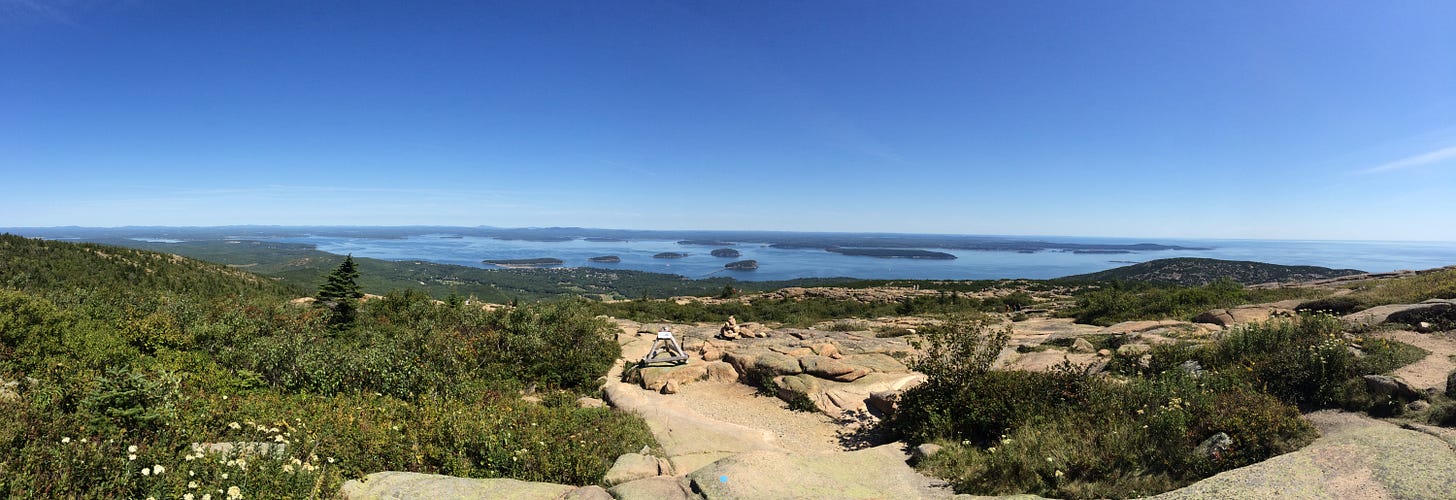I’m underslept, but as I read Alicia Kennedy’s post on Martha Stewart this morning, it sparked something. I was going to just share a screenshot on Instagram, but then I realized I had more to say, so here we are.
My mother was not a fan of Martha Stewart. She’d grown up rebelling against the domestic expectations of the 1950s, so for her, there were few magazines that beckoned less in the supermarket line. I absorbed her version of feminism, rejecting tidy home crafts and intricate pies and what I thought they symbolized.
As I grew up and left home for college, it was easy for me to keep on not caring much about Martha. If I thought about her at all, which was rare, I was reflexively suspicious, as I was of most people with money enough to afford more than one home. I’ve evolved from this, somewhat, but I’ve still managed to ignore Martha Stewart for most of my life.
There is one exception. I worked for a college summer on Mt. Desert Island, in Maine, around the corner and down the street from her house there. (She was, I think, still on probation, so the gossip was high.) While the house itself was out of sight, the edge of the property was as dense with mossy forest as the island’s national park. That made an impression. I wanted to live exactly there.
Jealousy is revealing; I had to admit to myself that there might be something to having the kind of money that could grant me the personal freedom to move to such a place. Maybe this marked a moral slippage, some compromise of ethics from teens to twenties — I think it spoke to a feeling that had been growing steadily since I’d left New Jersey (as Martha herself did), that I needed to find a way to self-sufficiency. (I have chosen the least strategic routes toward that, again and again, but still.)
That summer on the island I took up running for the first time, jogging from the school where I was living and working downhill to the dock, around a bit, and uphill again, a loop of about a mile. There’d been something lodged on a brake inside me, and suddenly, miles up the Eastern seaboard from my old home, it was gone.
My run took me past the edge of Martha’s property, and briefly, I would think of her house on beyond the forest, or what I imagined it to be, which was really a way of imagining my own. I have been imagining my own home since, in each dorm room and apartment I’ve lived in. Only recently have I looked up and realized I’ve arrived, that I have built my home, though it is very small and rented. (Will I ever own? Probably not. Another post.)
To speak of the power of imagination is terribly trite. But I think it is the closest thing we have to magic. It does literally build worlds.
This week I remembered in my bones the sudden importance that cooking and baking and hosting took on for me in 2016. They became tangible, imaginative acts of care, and therefore survival. Please believe, I do not fetishize domestic work. I live alone now, after more than a decade of living with someone else to split the work with, but even when I was married, it was hard, and never-ending, even in a one-bedroom apartment! It’s exhausting, distracting from other things I also don’t have time for, and it frequently sucks. But it is also potent, or can be, at least for me.
Here is the passage from Alicia’s excellent newsletter that sparked this:
What [criticism of Martha Stewart’s media product] sounds like to me is the protection of a neoliberal status quo that takes a paternalistic perspective on how working people should spend their time and money: It’s dangerous for regular people to imagine it possible that the bread could be freshly baked, the fragrant roses just cut. Stewart made her billions, funnily enough, on getting people to desire just that.
Watching the Martha documentary this week reminded me that domesticity is a powerful thing, living and lifestyle are powerful things, and they can be wielded for the right reasons: not in service to making billions of dollars, or the individual nuclear family, or a fundamentalist tradwife homesteading fantasy, but to a more convivial way of living. “Living is limitless,” she says…





